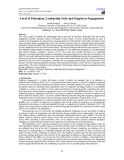Level of Education, Leadership Style and Employee Engagement
Abstract
This study sought to establish the relationship between the level of education, leadership style and teacher engagement in public secondary schools of Murang’a County, Kenya. A survey research design was used. A sample of 368 respondents was selected from a target population of 3,860 teachers in 306 public secondary schools using systematic random sampling followed by use of random numbers. Data was collected using a questionnaire. Descriptive statistical methods like mean and percentage, and inferential statistical methods like F-test and t-tests (at 0.05 significance level) were used for data analysis. The research findings indicated that more teachers (75.7%) were Bachelors Degree holders in relation to the principals (51.4%) while more principals (41.2%) had attained their Masters Degrees compared to teachers (12.8%). The results also revealed that there was a significant difference on the perception about employee engagement among respondents due to their level of education. The
ANOVA-test results indicated that there was no statistically significant difference between the compared levels of education except between Diploma and Masters. The study recommended that the Teachers’ Service Commission should come up with a policy that guides on brilliant ways of engaging the knowledge, skills and abilities of the teachers who had earned postgraduate education while teaching in secondary schools and also compensate them appropriately. This study contributes to the existing body of knowledge in drivers of employee engagement domain that are significant to school leaders
URI
https://www.iiste.org/Journals/index.php/JEP/article/view/55300http://hdl.handle.net/123456789/4525
Collections
- Journal Articles (BE) [333]

